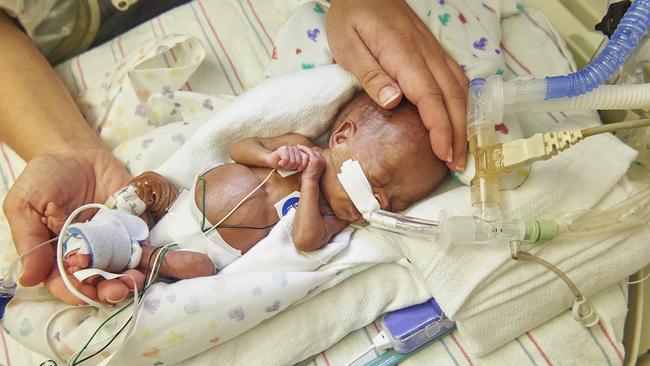SA research shows omega-3 dramatically cuts preterm birth risks
A landmark South Australian research project — which checked 20,000 women worldwide — has revealed omega-3 supplements dramatically cut the risk of preterm births.

- Preterm births have increased by 40 per cent over 28 years
- New drug showing early promise to help prevent preterm births
Landmark research by South Australian scientists shows a simple omega-3 supplement massively reduces the risk of premature births among women carrying single babies.
A local study of 700 women which saw the “fish oil effect” was followed by a comprehensive analysis of 70 studies worldwide involving more than 20,000 pregnant women where omega-3 — found in fish, nuts and seeds — was taken.
It found the supplement saw a 42 per cent reduction in babies born at less than 34 weeks, who typically need neonatal intensive care to survive and thrive.
It also saw an 11 per cent reduction in babies born at less than 37 weeks.

The findings, from a collaboration between the South Australian Health and Medical Research Institute (SAHMRI), the University of Adelaide and the Women’s and Children’s Hospital, is published today by the international Cochrane Library.
It also comes in the month SAHMRI celebrates its fifth birthday — and emphasises its “bench to bedside” brief to swiftly turn research into action that can benefit public health.
SAHMRI Healthy Mothers, Babies and Children Theme Leader Professor Maria Makrides told The Advertiser the findings have huge implications for the survival and long term health of newborns, for families’ anxiety — and also for taxpayers.
“This is an extremely promising finding because we now have strong evidence that omega-3 supplements are a simple and cost-effective intervention to prevent premature birth, which we know has serious health implications,” Prof Makrides said.
“Premature birth complications are the leading cause of death for children under five years of age.
“Premature babies are at greater risk of chronic issues with their respiratory, immune and digestive systems and they’re more susceptible to problems with speech, social skills, learning and behaviour.
“The benefits for families are hard to quantify in dollar terms but they are huge. It is a child issue, a family issue and a cost issue for the community — neonatal intensive care costs around $3000 a day.”

In SA there are around 20,000 births a year, and nationally around 300,000 — about 10 per cent are preterm, and about 2 per cent are born at less than 34 weeks needing neonatal intensive care.
Prof Makrides’ team suggests women expecting a single baby begin taking a daily dose of omega-3s at the 12-week stage of pregnancy. The supplement needs to contain between 500 and 1000mg of omega-3 with at least 500mg of the omega-3 called DHA.
“It can reduce the risk of early preterm births, at less than 34 weeks, by 42 per cent — these are big figures and that’s why we are so excited,” Prof Makrides said.
“Even a few extra days in the womb can make a substantial difference when it comes to your baby’s health.
“Supporting premature babies in intensive care, and treating ongoing health problems related to premature birth, places an enormous burden on the health system’s resources and finances.”
The findings will put pressure on policymakers to actively promote omega-3 supplementation for pregnant women.
Health and Wellbeing Minister Stephen Wade said a reduction in premature births would have widespread benefits for the community.
“The evidence from this review is both exciting and compelling, and something that needs to be investigated further,” he said.
The Royal Australian and New Zealand College of Obstetricians and Gynaecologists dietary recommendations for pregnant women include taking supplements of folic acid and iodine.

They also say omega-3 can be important “for some women” who have a low seafood diet — but this is for nutritional reasons, noting “No conclusive evidence of benefit using fish oil supplements in pregnancy is yet confirmed and further meta-analysis and well powered, high quality trials are needed.” These were issued in 2015, and now may need to be updated.
As well as the analysis of international data, SAHMRI is running a follow up study of 5500 women who were asked to take a daily omega-3 supplement during their pregnancy — some had fish oil, others vegetable oil so researchers can check for differences.
Once they reached 34 weeks gestation they were taken off the oil, in the hope the effect cuts out by they time they reach full term so there is no extension beyond the expected delivery date.
Prof Makrides noted there are many questions still be answered, such as should all pregnant women take omega-3 and how can it be best targeted.
The original SAHMRI study was of 2399 women around issues of post natal depression, and included 700 women picked at random who agreed to take the omega-3 supplement during their pregnancy to see if it made any difference to their child’s brain development.
It didn’t.
Prof Makrides said while this was initially disappointing, the finding that it extended the average gestation sent the research in an exciting new direction set to benefit families around the world.

